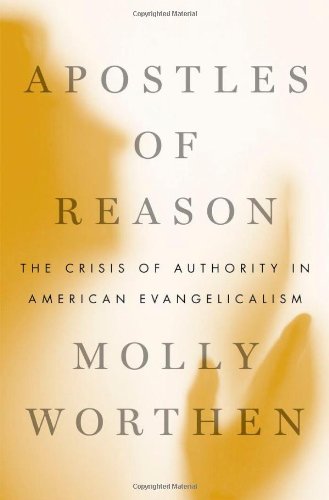Apostles of Reason
The Crisis of Authority in American Evangelicalism
Molly Worthen
Oxford: Oxford University Press
ISBN 978-0-19-989646-2
viii + 352pp; hbk; £18.99
Worthen, assistant professor of history at the University of North Carolina at Chapel Hill, paints an interesting picture of North American evangelicalism.
Surprising in a history of evangelicalism there is no mention of Bebbington’s quadrilateral as the defininition of evangelicalism, so then how does Worthen define evangelicalism? In a sense she doesn’t. She presents a wide-ranging consortium of views and these include anabaptists, methodists and pentecostals. She rightly notes that defining it has produced more debate than agreement (p 3) and she sees history as being the best too for ‘pinning down’ evangelicals (p 4).
She attempts to answer three questions (p 6) which evangelicals seem obsessed with: how to reconcile faith and reason; how to know Jesus; and how act publicly on faith in an increasingly secular public square. An intellectual civil war!
She focuses both on institutions - for example Wheaton College, Fuller Seminary, Biiola, Bob Jones University, Christianity Today - and individuals - J. Gresham Machen, Carl Henry, Francis Schaeffer, Billy Graham, Howard Ockenga, John Howard Yoder and George Eldon Ladd, James Dobson and Hal Lindsey, Harold Lindsell all get largish parts.
Surprisingly Gordon Clark has more than a bit part. Wheaton College’s (1936-43) Clark is mentioned along with Cornelius Van Til regarding presuppositionalism, which Worthen maintains they developed from Abraham Kuyper (p 30), but also as a mentor for Carl Henry and Edward Carnell, and in relation to the development of the notion of Weltanschauung (world- and life-view)among (neo)evangelicals. See shows how worldview has become a powerful rhetorical strategy; we have worldview academy, worldview initiative, worldview curriculum, worldview studies, for most of them their understanding of worldview is a far remove from the espoused by Kuyper.
Surprisingly Gordon Clark has more than a bit part. Wheaton College’s (1936-43) Clark is mentioned along with Cornelius Van Til regarding presuppositionalism, which Worthen maintains they developed from Abraham Kuyper (p 30), but also as a mentor for Carl Henry and Edward Carnell, and in relation to the development of the notion of Weltanschauung (world- and life-view)among (neo)evangelicals. See shows how worldview has become a powerful rhetorical strategy; we have worldview academy, worldview initiative, worldview curriculum, worldview studies, for most of them their understanding of worldview is a far remove from the espoused by Kuyper.
Worthen, as an evangelical outsider, draws a fascinating picture of evangelicalism, her book will help evangelicals see themselves from another’s perspective and help them better contemplate what of evangelicalism is God-given and what is cultural fluff.


No comments:
Post a Comment